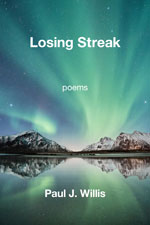I saw her face in the aspen grove
composed where the wind and branches wove
a halo of dusk-burned clouds in her hair,
and she was fair.
—from “In the Aspen Grove”
 During Covid, to cheer himself up, Paul Willis found himself writing and publishing light verse. The resulting poems in Losing Streak blend humor with utter seriousness in traditional meter and rhyme. Subjects range from the academic to the erotic to the natural to the political, with the specter of death made bearable by the rhythms of humankindness.
During Covid, to cheer himself up, Paul Willis found himself writing and publishing light verse. The resulting poems in Losing Streak blend humor with utter seriousness in traditional meter and rhyme. Subjects range from the academic to the erotic to the natural to the political, with the specter of death made bearable by the rhythms of humankindness.
Buy at Amazon Buy at Publisher
